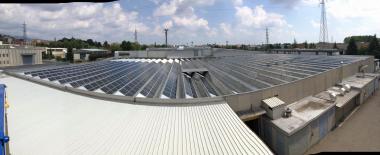Marchi & Fildi Group: Positive balance for 10 years of the photovoltaic installation
10 years after the installation of the photovoltaic plant in the production units in the Biellese region, the Marchi & Fildi Group takes stock of the operation and publishes the data on energy produced, consumed, and fed back into the grid.
The photovoltaic plant owned by the Group is made up of 11,385 modules divided between the three facilities in Biella (Production), Cerrione (Dyeing mill) and Verrone (Logistics), which in total cover a surface of 16,515 sq.m.
The balance to be drawn from these 10 years is a positive one: in total 22,974,828 kWh have been produced, of which 7,292,027 kWh have been used in company activities, with a saving in energy costs of approximately €1m over 10 years.
The energy kWh produced and not used by the company was fed back into the grid and corresponds to the average annual consumption of around 4630 families.*
The Marchi & Fildi Group has always been committed to rationalising electric energy consumption with the aim of contributing towards an eco-sustainable development without compromising the rate of production and the ability to grow. In addition to producing its own electric energy, over the years, the company has also achieved an increasing number of Energy Efficiency Titles (TEE), otherwise known as white certificates. In 2021, 138 TEEs have been awarded as a result of such interventions as the introduction of LED lighting and the optimisation of the production processes which, while still as efficient as before, permit the company to reduce the electric energy consumption of the machinery.
*In the meter class for the range of 3kW to 4.5 kW, the average consumption for residential properties is the equivalent of 3,382 kWh (source: Arera Relazione annual state of services for the year 2020). The calculations are the results of an internal study conducted by the Marchi & Fildi Group.
Marchi & Fildi Group







